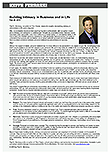The I Factor™
Simple Insights for Connecting in Your Personal Relationships
Keith Ferrazzi – Building Intimacy in Business and in Life
Posted on February 20, 2013 in Media Buzz | Paul N. Weinberg, co-author of The I Factor, shares his insights into building intimacy in relationships in this guest blog post.
Paul N. Weinberg, co-author of The I Factor, shares his insights into building intimacy in relationships in this guest blog post.
Why, as a complete departure from anything I’ve done professionally, did I co-author a book about intimacy and connection in relationships? Despite my accomplishments, I believe I would have been more successful – and more fulfilled as a human being – if I had learned earlier in life how to build and maintain personal connections, both personally and in business. I’ve come to understand that success and satisfaction are all about authentic personal connection and that there’s a direct correlation between personal relationships and professional success.
Why?
Without the support of stable, personal relationships, it’s more difficult to be successful in any aspect of your life, including business. And if you’re unable to connect with people in your personal life, you’ll most likely be unable to do so professionally as well. This is because the ability to develop successful relationships is just as important in business as in your personal life. People do business with people they like, and opportunities arise based on the network of people who know and like you – in fact, it’s often the deep personal connection on which your professional relationships are based that can be vital to your success. Virtually all of my professional successes involved a business partner who already was, or became, a close friend.
Aside from my ex-wife, with whom I wrote the book, The I Factor (yes, we see the irony in that), my most enduring personal relationships are with my two long-term business partners. My first partner and I became close friends when I worked for him in a small high-tech startup, and together we wrote two best-selling technical books while building a software company that we sold to Apple. My second partner and I became close friends only after we became partners, and together we developed and sold our software company to SAP.
In both cases, the stability of the underlying friendships fueled our creativity and productivity, while simultaneously allowing us to navigate the shoals of challenging business climates (anyone recall the dot-com bust of 2000?) as well as the rocky times that inevitably face all relationships. It would be an understatement to say that my partners and I are best friends, emotionally close and in an intimate relationship because nothing I’ve accomplished on my own has ever compared to my achievements with these close friends.
That’s because all relationships are personal, especially professional ones. And the only way to create meaningful relationships in which people care about you and want you to succeed is by letting them see the real, vulnerable you. But while relationships in business foster professional success, building personal relationships contributes to happiness, fulfillment and an overall sense of well-being.
This doesn’t suggest that all professional relationships can or should achieve the same level of emotional intimacy as our personal relationships. And yet, both personal and professional relationships are fashioned from the same basic building blocks of personal connection, blocks that are layered and interconnected in subtle ways and include the following:
- Self. Personal connection requires that you start with a connection to yourself, without which you cannot have a connection with someone else. To be connected to yourself means to be able to identify and accept your feelings without self-judgment; to know what you want and need; to be aware of your boundaries; to trust yourself; and to have clarity around what you are willing to accept and tolerate in your relationships.
- Respect. The many forms of respect include self-respect, in which you don’t sacrifice yourself to be in the relationship; mutual respect, where you and your partner support and approach each other as equal participants in the relationship; respect for the sanctity of the relationship itself as it relates to the rest of the world; and respect for differences between you and your partner.
- Trust. Personal connection is built on a foundation of mutual trust. Trust is earned and takes time to establish, and expectations of trust cannot exceed either partner’s level of comfort. It’s only through testing the waters a little bit at a time that you are able to build a foundation of trust on which to base the relationship.
- Openness. Openness is a key component of personal connection; coupled with trust, it leads to a vulnerability that encourages your partner to be vulnerable as well. Progressive disclosure and a self-reinforcing cycle of trust, safety and willingness to reveal deeper layers of yourself lead to meaningful personal connections. Without openness, relationships merely skate along the surface.
- Courage. Personal connection takes courage! This includes having the courage to express your feelings and needs; to make yourself vulnerable even when it might lead to conflict; to stay focused on your own issues rather than those of your partner; and finally, to believe in yourself enough to stand up for yourself.
Beyond these basic building blocks, intimacy and personal connection are comprised of hundreds of details and thousands of nuances. They are acquired skills that can take a lifetime to master, and only if you are willing and able to increase your awareness, broaden your perspective and keep an open mind. The payoff is that they will allow you to achieve meaningful connections in all of your relationships, facilitate your own personal growth, and contribute to your overall sense of connectedness, serenity and well-being.

The Authors
Media Buzz
Reader Reviews
- Just finished The I Factor and loved it! Everybody go buy two books, read one yourself and keep it around, and give the other one ...





